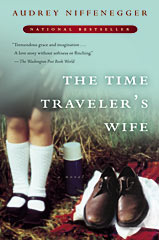The Time Traveler’s Wife
by Audrey Niffenegger
 I have always been a book addict of the sci-fi/fantasy persuasion (though admittedly stronger on the fantasy side), and time travel is one of those devices that occurs in both, so I’ve had a good amount of exposure to theories put forth about it in fiction. I start with this so that when I say The Time Traveler’s Wife has one of the more unique takes on time travelling that I’ve read, you understand it’s not just lip service. Three things about Niffenegger’s setup make it that stand-out:
I have always been a book addict of the sci-fi/fantasy persuasion (though admittedly stronger on the fantasy side), and time travel is one of those devices that occurs in both, so I’ve had a good amount of exposure to theories put forth about it in fiction. I start with this so that when I say The Time Traveler’s Wife has one of the more unique takes on time travelling that I’ve read, you understand it’s not just lip service. Three things about Niffenegger’s setup make it that stand-out:
- It’s sheer randomness and uncontrollability. The time traveler, Henry, has no control over when or where he’ll jump – coming or going. He gets a few seconds of nausea as warning, at most, and then is dumped in some random time and place. The confusion and hardship this engenders for him, again and again, as shown through the portions of the story in his point of view, serve to turn him into a victim of this ability, rather than an all-powerful wielder. This overturns the normal perspective on such a power; in other stories, the ability to travel through time is sought after, coveted, and relished. In Henry’s case, it seems clear he’d wish nothing more than to be rid of it.
- It’s internal consistency. One of the long-standing conundrums about time travel is that if you travel from a certain present into the past, and change something, the present you came from would no longer exist in exactly the way it had that brought about you and your choice to time travel, so wouldn’t that negate you and your actions, perhaps winking you out of existence? (I’m summarizing, it’s a bit more twisty than that). Niffenegger deals with this issue deftly, and perhaps obviously: Henry can’t change events in his past. They happen as they have always happened, no matter how many times he is jumped back to see them unfold. Any actions his future self has in past events are actions that his past self already knows has happened, and he has no other choice. He can also never take anyone or anything with him, which neatly sidesteps another of time travel’s potential pitfalls: taking something from the future into the past, leaving it/showing it to others, and thereby altering the past. Perhaps she’s taken the easy way out, dodging these usual issues, but she is consistent and within the framework of her story it works.
- It’s modus operandi. There is no device or gadget that Henry uses to time travel, no DeLorean or Terminator-devised science. Nor is there any incantation or ritual that has to be spoken or sung, as in Modesitt’s world of Erde. Instead, it is a minute mutation of Henry’s basic DNA that has given him this power; a mutation that seems to not be done developing, as events at the end of the book seem to indicate (attempting not to be a spoiler). The only other time I’ve seen time travel powers engrained in a person’s genetics is in Jasper Fforde’s Thursday Next series, but it’s quite a different animal in those books. Henry’s suspicion that the problem lies in his DNA, his quest to find a cure, and his fear of passing it on to any children with Claire add a extra dimension to both the plot and Henry’s character.
All this hasn’t even touched on the subject of the other main character, Claire, who is after all the title character. Aside from the new take on time travel, this book is above all about the intersection of these two characters’ lives, and their love for one another. The story, told alternately between her point of view and Henry’s, is engrossing, engaging, and moving – they are both deep, complex characters who the reader comes to care about. There is some confusion keeping track of ‘when’ you are in the story, so to speak, but Niffenegger conveniently notates the relative ages and dates at the beginning of each section.
Happily, the movie version does an excellent job of keeping true to the core of the story and the characters, even though many subplots get cut to fit it into standard-length film format. I’m not ashamed to admit I cried during both the book and the movie, though more in the former since it drew me in deeper. I definitely recommend the book, and I’d advise reading that before seeing the movie (which doesn’t have the handy age and date notations when it jumps around in the timeline).
I give the book: 4.5/5 stars.
I give the movie: 4/5 stars.










